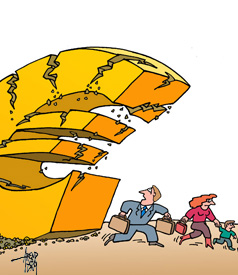Jean-Claude Trichet, the president of the European Central Bank, is sounding hawkish about inflation again, indicating in interviews that the bank will raise interest rates if officials see the need, even as countries struggle to recover from debt crises.
My former professor at the Massachusetts Institute of Technology, Charles Kindleberger, once wrote that from the existence of multiple financial measurements arose one great virtue: observers, by picking and choosing, could always be optimistic or pessimistic, depending on their temperament.
The same thing is happening now with inflation measures. In particular, by switching back and forth between core inflation (which excludes things that are subject to volatile price fluctuations, like energy) and headline inflation (which doesn’t exclude anything) you can always find reasons to fear inflation, no matter where you look.
Which brings me to Mr. Trichet’s latest warnings about inflation. According to Eurostat data, in the last five years, inflation in the euro zone has behaved a lot like inflation in the United States: Low and falling core inflation in the face of a depressed economy, with big swings in headline inflation when commodity prices fluctuate. But Mr. Trichet says that the headline number is the one to watch. “In the U.S., the Fed considers that core inflation is a good predictor for future headline inflation,” he told The Wall Street Journal on Jan. 24. But “core inflation is not necessarily a good predictor” in the euro zone, he said.
Of course, those of us whose memories stretch back more than a few months can only say: hmmmm.
First of all, if headline inflation is the one to watch, why wasn’t the E.C.B. all worked up about below-target headline inflation in 2009? I don’t recall a lot of speeches about the need for monetary loosening then. Why, it’s almost as if the E.C.B. switches between inflation measures to pick whichever one currently makes the case for tighter policy.
Second, the E.C.B. relied on their current argument back in 2008, and raised interest rates even as the world was sliding into financial crisis. One might have expected Mr. Trichet to be a bit humbled by that experience. But I guess not.
What’s really going on is that the bank is catering to Germany’s desire for low inflation, making the problems of peripheral economies much less tractable.
The E.C.B. is clearly gearing up to do the wrong thing as soon as possible, and this is going to be ugly.
© 2010 The New York Times Company
Truthout has licensed this content. It may not be reproduced by any other source and is not covered by our Creative Commons license.
Paul Krugman joined The New York Times in 1999 as a columnist on the Op-Ed page and continues as a professor of economics and international affairs at Princeton University. He was awarded the Nobel in economic science in 2008.
Mr Krugman is the author or editor of 20 books and more than 200 papers in professional journals and edited volumes, including “The Return of Depression Economics” (2008) and “The Conscience of a Liberal” (2007).
Copyright 2010 The New York Times.
Join us in defending the truth before it’s too late
The future of independent journalism is uncertain, and the consequences of losing it are too grave to ignore. To ensure Truthout remains safe, strong, and free, we need to raise $44,000 in the next 6 days. Every dollar raised goes directly toward the costs of producing news you can trust.
Please give what you can — because by supporting us with a tax-deductible donation, you’re not just preserving a source of news, you’re helping to safeguard what’s left of our democracy.
